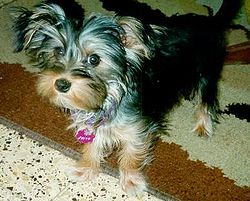| Revision as of 23:54, 15 May 2004 edit198.26.118.36 (talk)No edit summary← Previous edit | Revision as of 00:21, 16 May 2004 edit undoElf (talk | contribs)Extended confirmed users19,731 editsm copyedit.Next edit → | ||
| Line 45: | Line 45: | ||
| The '''Yorkshire Terrier''', fondly known as a '''Yorkie''' is a ] of small ]. | The '''Yorkshire Terrier''', fondly known as a '''Yorkie''' is a ] of small ]. | ||
| Yorkies can be very small indeed, usually not weighing more than about 5 or 6 pounds (less than 3kg.) You can easily carry a yorkie in a large coat pocket or a bookbag. |
Yorkies can be very small indeed, usually not weighing more than about 5 or 6 pounds (less than 3kg.) You can easily carry a yorkie in a large coat pocket or a bookbag. | ||
| Their coats are typically black or grey on the body, with more brown and gold on the faces and legs, but this can vary |
Their coats are typically black or grey on the body, with more brown and gold on the faces and legs, but this can vary. The fur in a ] is usually straight and can grow very long, sometimes so that it drags on the ground. Yorkies can also have wavy fur. Yorkie fur is soft, fine, and high-maintenance, and must either be trimmed short or washed and brushed frequently. | ||
| Unlike some other small breeds ( |
Unlike some other small breeds (Toy ], ]), Yorkies seem to recognize the limitations of their size, and are almost never aggressive. Yorkie personalities vary greatly apart from this, and they might be docile lap dogs or yappy and endlessly playful. | ||
| Yorkies typically get along well with cats or other dogs, and love to play together in groups. |
Yorkies typically get along well with cats or other dogs, and love to play together in groups. However, they are still ]s, and even an old, sedentary lap dog will eagerly hunt rodents.) Because they are so small, they are easily injured, so while they will get along very well with children, it can be dangerous for the Yorkie to keep it in a house with small or abusive children. Also, despite their small size, if continually provoked or if attacked, like all dogs, they pack a surprisingly powerful bite. | ||
| Yorkies may seem rather vapid and |
Yorkies may seem rather vapid and unintelligent at times (perhaps due to their yapping and playfulness), but they can easily be trained to perform simple tasks. | ||
| Yorkies tend to develop ] in their old age, but their small size limits the effects of conditions |
Yorkies tend to develop ] in their old age, but their small size limits the effects of conditions such as ]. | ||
Revision as of 00:21, 16 May 2004
| Name of Dog | ||||||||||||
|---|---|---|---|---|---|---|---|---|---|---|---|---|
 | ||||||||||||
| Common nickname | ||||||||||||
| ||||||||||||
| Country of origin | ||||||||||||
| United Kingdom | ||||||||||||
| Classification | ||||||||||||
| ||||||||||||
| Breed standards (external links) | ||||||||||||
| FCI, AKC, ANKC, KC(UK), NZKC |
The Yorkshire Terrier, fondly known as a Yorkie is a breed of small dogs.
Yorkies can be very small indeed, usually not weighing more than about 5 or 6 pounds (less than 3kg.) You can easily carry a yorkie in a large coat pocket or a bookbag.
Their coats are typically black or grey on the body, with more brown and gold on the faces and legs, but this can vary. The fur in a show dog is usually straight and can grow very long, sometimes so that it drags on the ground. Yorkies can also have wavy fur. Yorkie fur is soft, fine, and high-maintenance, and must either be trimmed short or washed and brushed frequently.
Unlike some other small breeds (Toy Poodle, Pomeranian), Yorkies seem to recognize the limitations of their size, and are almost never aggressive. Yorkie personalities vary greatly apart from this, and they might be docile lap dogs or yappy and endlessly playful.
Yorkies typically get along well with cats or other dogs, and love to play together in groups. However, they are still terriers, and even an old, sedentary lap dog will eagerly hunt rodents.) Because they are so small, they are easily injured, so while they will get along very well with children, it can be dangerous for the Yorkie to keep it in a house with small or abusive children. Also, despite their small size, if continually provoked or if attacked, like all dogs, they pack a surprisingly powerful bite.
Yorkies may seem rather vapid and unintelligent at times (perhaps due to their yapping and playfulness), but they can easily be trained to perform simple tasks.
Yorkies tend to develop cataracts in their old age, but their small size limits the effects of conditions such as arthritis.